Indie Monthly: August 2025
OFF, and so much more

There was a particularly significant game release in August, one that was high-profile but still did not receive the attention that it deserved.
Many of you have not heard of OFF, which is a crying shame, as it is easily one of the most significant indie games ever. This little cult RPG from 2003 has influenced many other games, either directly or indirectly via its descendants. OFF certainly didn't create the concept of an "Earthbound-like," but it popularized the idea, established many of the tropes, and spread it beyond the tiny Earthbound fan community of the era.
The rerelease of OFF is important, which is why it's the first game I'm featuring. August was a busy month, though, with no shortage of high-quality releases. I've said it before, but now I mean it: There's definitely something on here that you'll want to play next.
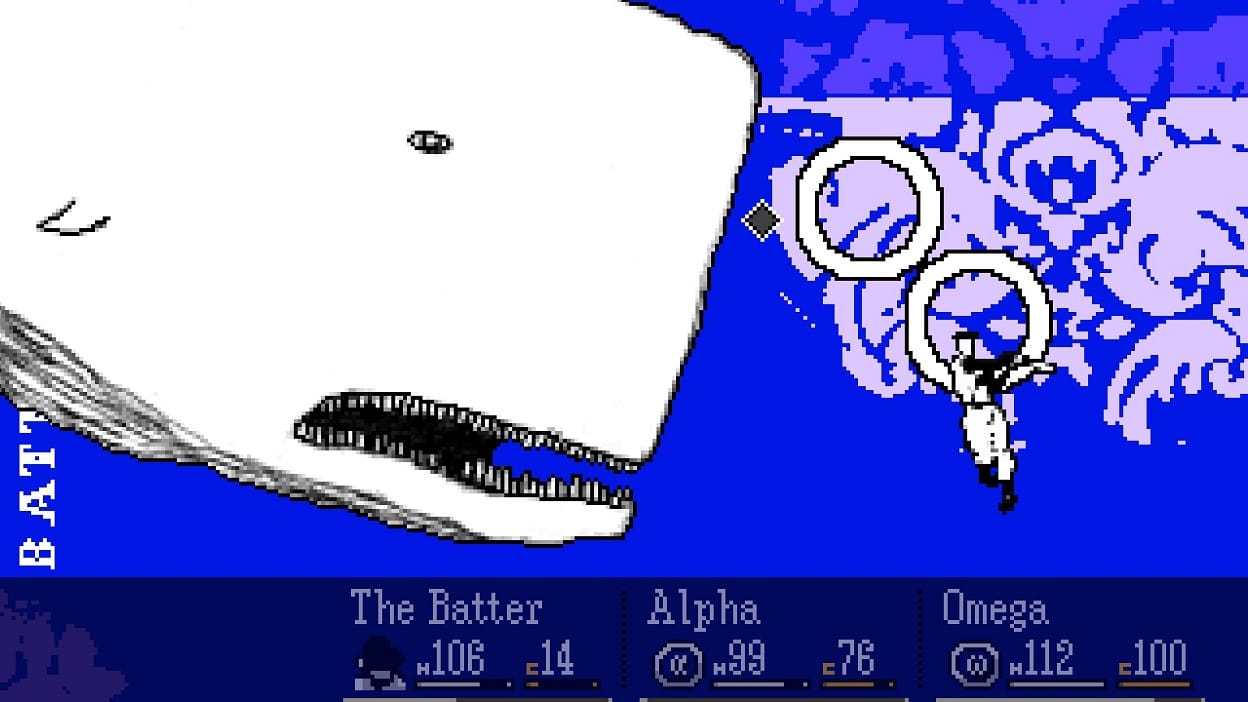
OFF
OFF is a rerelease and remaster of the legendary 2003 indie RPG. It's the same strange, symbolism-laden story with a refined translation, improved combat system, and some new content.
For those of you who've managed to miss it: OFF follows a nameless figure known only as the Batter, who is on a quest to purify his world of evil spirits. This leads him through a series of "Zones" occupied by neurotic beings called Elsen and ruled by petty tyrants called Guardians. This simple story quickly grows complicated, and by the end, it's not clear if the Batter is the good guy or what the Zones truly are.
OFF's cryptic story is key to its enduring popularity, with two decades of interpretation and fan theories. The rerelease remains true to that story, fixing some localization errors but otherwise leaving the plot intact.
Most of the substantial changes are behind the scenes. OFF was never known for its combat, and while the rerelease retains the simple retro-styled system, there are plenty of tweaks to make it a more enjoyable experience. Character stats are better balanced and easier to understand, and "competencies" - the player's special abilities - have been rearranged into a more sensible order such that a typical player will see more of them over the course of a standard game. A few of the longer areas even have new enemy types to make them less repetitive.

The most obvious and interesting combat tweak is how OFF handles its ATB (Active Time Battle) system. Enemy action bars are visible, which makes it easier for the player to plan things out. Criticals also have an added twist; when a character on either side rolls a critical, the action bar moves faster and features a visual flourish to distinguish it. This adds a small but potentially important tactical element to what's otherwise a simple system.
I have to take a moment to mention the soundtrack, which was completely redone. The old soundtrack was a big part of the game's surrealism, and it's sad to watch it go. However, the new soundtrack is still exceptional. It's more listenable than the original while maintaining that same bizarre feel.
Oh...and there are bonus bosses... lots of them.
I'm not sure what else there is to say about OFF that hasn't been said hundreds of times before. If you've never played it, now's a great time to give it a spin. If you have played it, this is a great time to summon up memories of a wilder, more inventive time.
OFF is available for PC via Steam and for Nintendo Switch. A copy was provided for this review.
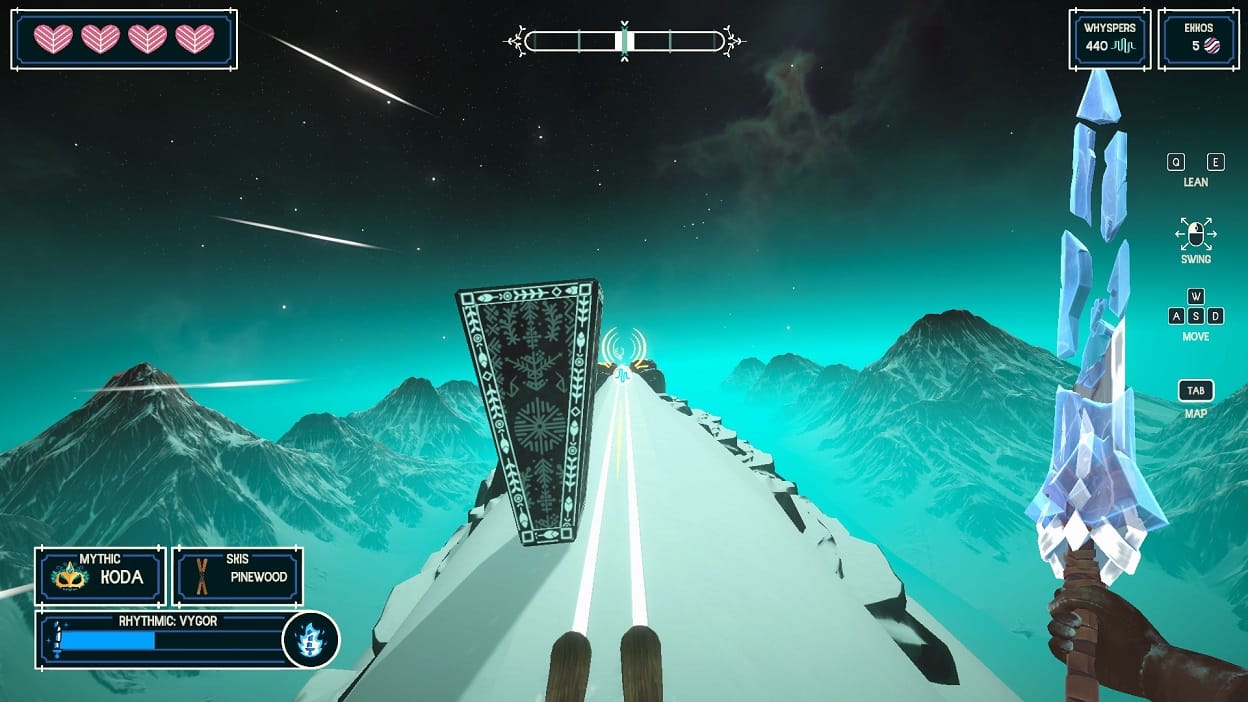
Fresh Tracks
Fresh Tracks is a rhythm-action game with roguelike elements. It's a strange twist on some well-trod ground, but one that's greatly appreciated and ideal for newcomers.
Norwyn is a land of music and adventure, with its legendary history captured in the Story-Songs of the divine beings known as Mythics. At least, this was true. Since Norwyn was conquered by Mar, the Mythic Queen of Terror, the songs have faded and lost their power. You are a lone warrior on an impossible quest to overthrow Mar. Your only hope is to rally the aid of the other Mythics and restore the power of Norwyn's music.
Hard as it may be to believe at first glance, Fresh Tracks is a rhythm game. The player rides through each level on skis, dodging or destroying obstacles and fighting off enemies while collecting pickups used for short- and long-term upgrades. Everything is set to the beat of the music, with the player gaining bonuses for perfectly timed strikes and dodges. There's plenty of variety in the soundtrack, which shifts between electronic, metal, and orchestral tracks throughout the game.

The core gameplay is very arcade-like, requiring a combination of quick reflexes and fast judgment. Experience with rhythm games helps with the former, but even masters of the genre will need to adapt their skills. Fans of reflex-focused action games will probably have an easier time getting the hang of it, and Fresh Tracks could be seen as something of a gateway for rhythm games.
There are some light roguelike elements in the game's layout; the long-term goal is to reach a series of "boss" areas - more difficult levels with much longer songs. Between bosses, the player faces a randomized selection of levels with different difficulty levels and bonuses.
The main effect of the roguelike elements is to allow the player to set the challenge level. Fresh Tracks can be a hard game, but there are many options to adjust the difficulty up or down. Aside from offering levels at varying difficulties, the player's choice of Mythic - the divine storyteller that accompanies them - also affects the challenge. Mythics earned later in the game will modify earlier levels to make them harder, offering unlockable items as a reward.
Overall, Fresh Tracks is a captivating game that does nearly everything well. As someone who's never been big on rhythm games but has played a lot of the more recent crop of music-oriented action games, this is a great entry point for anyone curious about the new generation of rhythm titles.
Fresh Tracks is available for PC via Steam and for PS5. A copy was provided for this review.
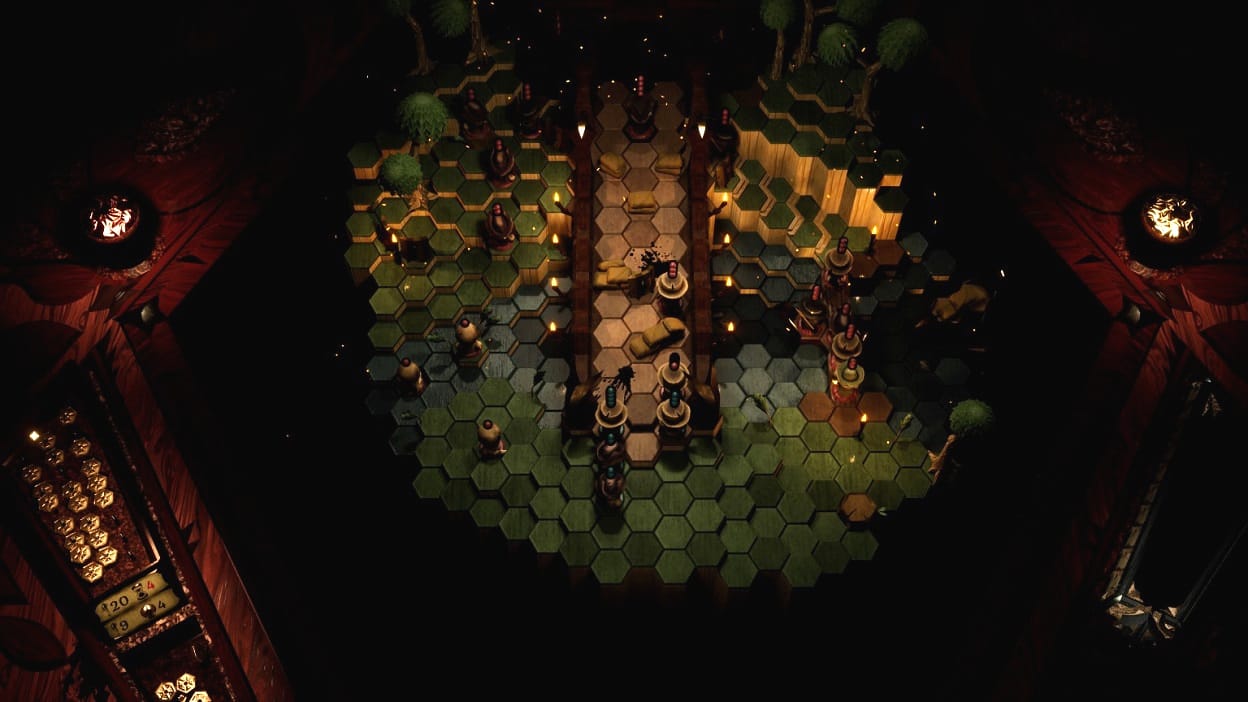
Inkshade
Inkshade is a roguelike built around a simple TRPG-like system. It is driven by story and atmosphere with a heavy focus on slow-building horror and the unknown.
You have awakened in a strange building, seated before a shadowy multi-armed creature who expects you to play a game with him. Taking on the role of a sky captain, you are tasked with assembling the gear needed to reach a mysterious area known as the abyss. As you delve deeper into the game and explore your surroundings, it soon becomes clear that there's something more going on here, but your captor isn't eager to reveal much - at least not until the game is over.
Let's get this out of the way right from the jump: Inkshade borrows a lot of aesthetic and design elements from Inscryption, including the general board game framing device, a faceless antagonist typically seen only as a pair of glowing eyes, and the ability to step back from the board and explore the environment freely. Where it differs is in the core gameplay, which is built around a simple tactical combat system.
At the start of combat, the player chooses a set number of pieces randomly selected from the available stock. Combat is quite basic, with most of the units lacking any unusual attributes. Any player pieces that are defeated are gone for the duration of the run, but the player can also earn temporary pieces from winning fights or encountering certain events. Permanently available pieces can be upgraded between runs, which makes Inkshade play more like a conventional RPG than a roguelike. It's a functional system, though it can grow repetitive after a while.
However, let's return to the aesthetics for a moment, as this is a definite strength. Both the game board and the surrounding building are highly detailed and interesting to explore, and the rooms beyond the board are full of puzzles and secrets. The sound design is a particular standout, with the hollow rattle of the game pieces having some real resonance. It all combines to create a subtle, pervasive sense of dread - horror built around uncertainty over what you're experiencing.
Overall, Inkshade is well worth considering for horror aficionados, but roguelike fans might want to give it a pass.
Inkshade is available for PC via Steam. A copy was provided for this review.
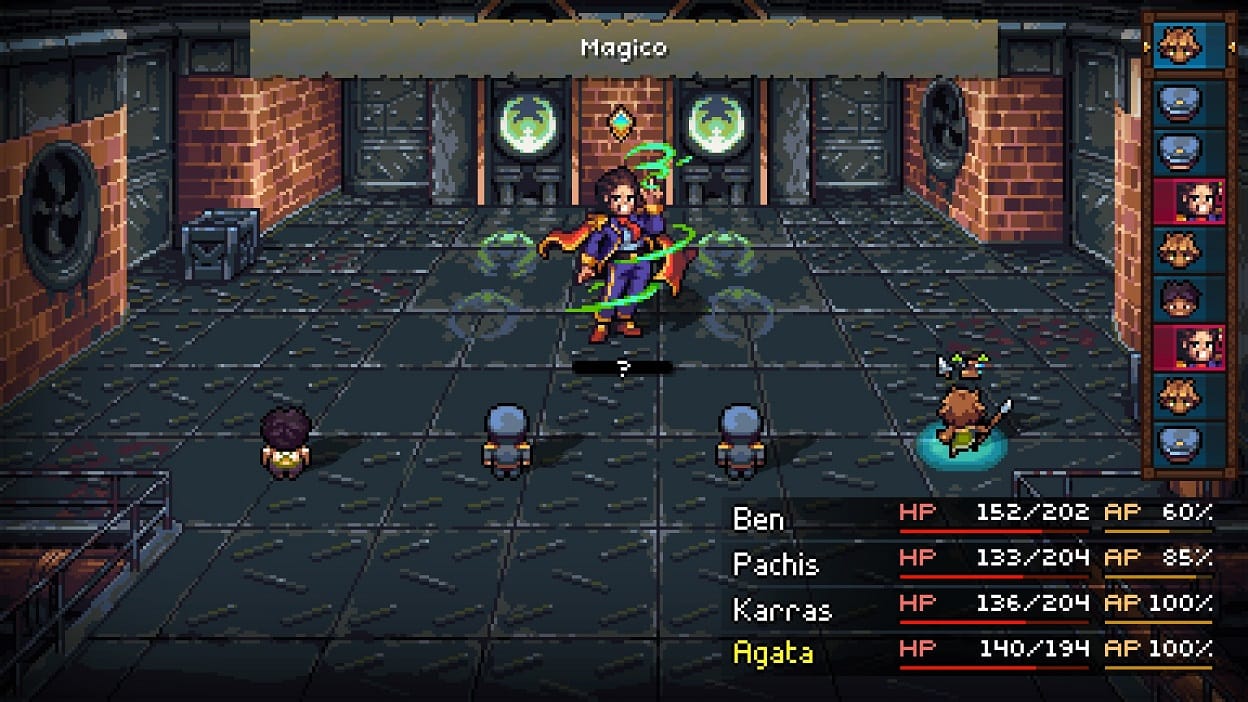
Quartet
Quartet is an old-school console-style RPG with a modernized combat system and a narrative that focuses heavily on its unusual setting.
Quartet is the story of magic and how it affects the lives of four people - a chef, a minor noble, a soldier, and a shop assistant. Each of them comes from a different land with a different philosophical approach to magic, treating it as an everyday tool, a long-abandoned superstition, or a looming threat. Slowly, their individual stories converge upon a common point and a grand secret that unifies all of their societies. A disaster broke their world in the past, and they'll have to race to stop it from happening again.
The game is a traditional JRPG using the staggered turn system that's now more or less standard to the genre. Combat mechanics are also typical, though there are a few quirks. There's a greater emphasis on special abilities, with all characters regenerating their mana automatically and each having an ability that accelerates that regeneration further. Regular attacks also have their own distinct elements, which is important as hitting weaknesses is particularly important here.
There are lots of party members, though only two permanent members from each of the four introductory stories. After completing the intro sequence for each of the protagonists (which takes around 5-6 hours), the player will have an eight-person party with four active members at any given time. On any character's turn, the player can swap that character for an inactive member without giving up that turn. Inactive party members continue to regenerate mana, so swapping is key to taking full advantage of everyone's skills.
Returning to the story, Quartet is something of a mixed bag. The characters are varied and distinct in their personalities and voices, and the setting - which is absolutely central to the plot - is a creative masterstroke. However, the science fantasy story also lends itself to an excess of expository dialogue, and the whole thing ends up coalescing around a World War II allegory that doesn't quite land. And the less said about the humorous sections, the better.
Overall, Quartet is an old-school RPG meant for fans of the style. It's not going to change anyone's mind, but it's a great throwback all the same.
Quartet is available for PC via Steam. A copy was provided for this review.
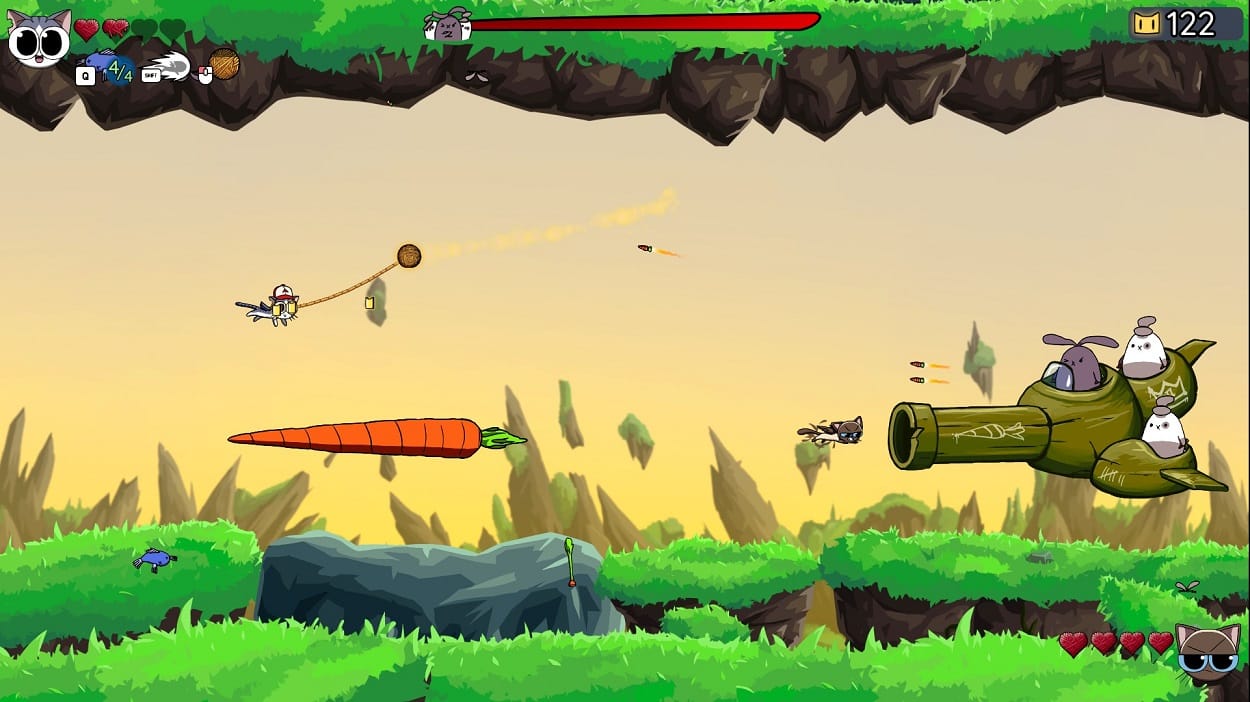
Yarn Guardians
Yarn Guardians is a twin-stick shooter with some Metroidvania-influenced design elements. It's a multiplayer-focused game that can be played solo, but is better with friends.
Rudy is a winged cat enjoying an easygoing life until an army of rabbits attacks his peaceful home. Cleaning up after the skirmish, he learns that he's part of a lineage known as the Yarn Guardians, caretakers of arcane balls of yarn that won a war over the other species in ancient times. One of those enchanted yarn balls is in the house, and everyone wants to lay their paws on it. Thus begins a journey that will see Rudy traversing the land, meeting allies, and wresting control of the other yarn balls from assorted villains.
While it's promoted as a Metroidvania, Yarn Guardians has only minimal exploration elements, being far more focused on combat. Most fights take place in large, open areas to take advantage of the main character's freedom of movement. The protagonist can fight with either a melee attack or by using one of the balls of yarn acquired through the story. These offer a range of offensive options, though using one repeatedly will run down its energy until it becomes unusable. Savvy players can switch between yarn types, allowing the low-energy ones to recover while continuing the fight.
Yarn Guardians leans pretty heavily into its multiplayer options, particularly co-op. Rudy gets companions at certain story points, which can be controlled by another player. In single-player mode, the computer controls these companions and does a capable job in helping out with the more intense fights. However, it's pretty clear that this was designed more as a multiplayer experience, and you might want to bring a friend along if one is available.
Overall, Yarn Guardians is a respectable twin-stick shooter distinguished mainly by its multiplayer and co-op.
Yarn Guardians is available for PC via Steam and EGS and for Nintendo Switch. A copy was provided for this review.
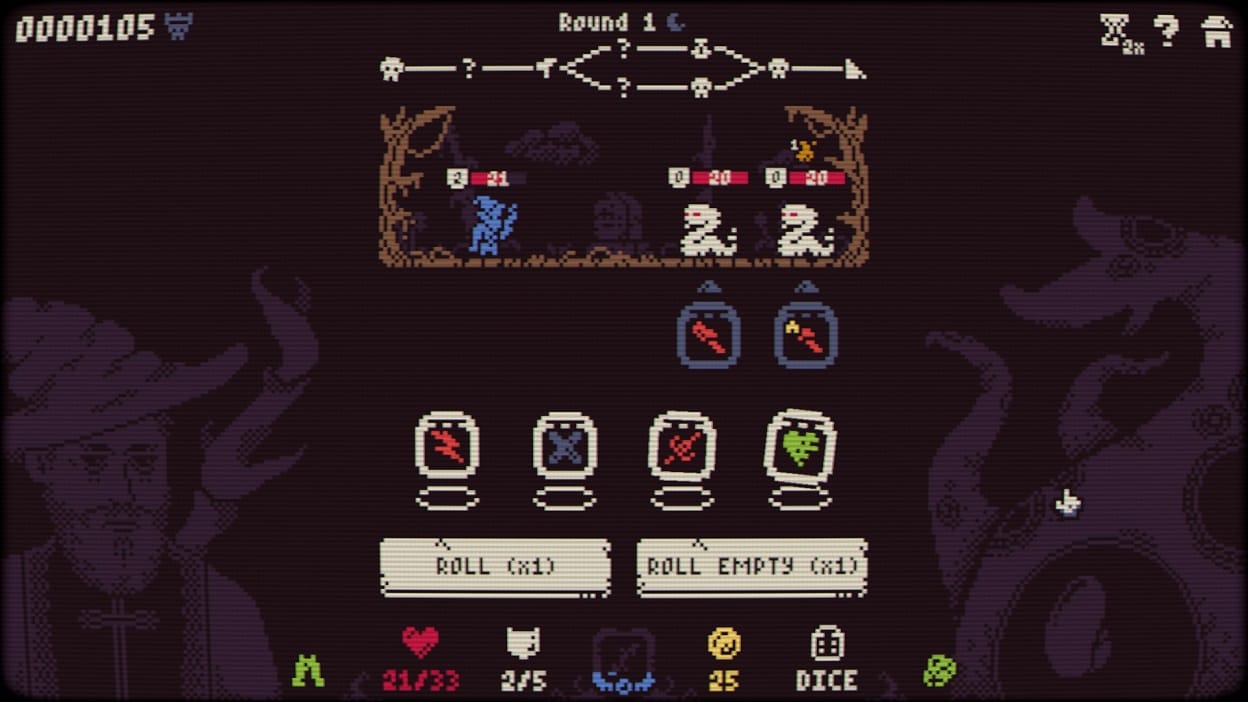
Luck & Loot
Luck & Loot is a dice-based roguelike with a focus on customizing a small set of dice. As with most similar games, manipulating luck and mitigating risk are the key abilities.
The player has four dice, which are rolled each round. The faces on these dice can include any standard deckbuilder skill types - damage, block, healing, and utility. There is no energy, and the player can play all four dice each round, though it is possible for a die to land on an empty side that does nothing.
As with any dice-based game, learning how to control luck is necessary. The means of doing this in Luck & Loot are far simpler than in something like Astrea. Each turn, the player gets a set number of rerolls that can be used to selectively reroll any or all of the dice. The limits of this method require that the player also properly structure the dice.
Each die is massively customizable. The player earns new skills that can be added to one side of a die or sacrificed to level up one of the dice, adding passive abilities. The only restrictions here are the number of faces and a capacity limit that stops the player from stacking powerful abilities on one die. Skills can be swapped around at any time outside of battle, but breaking the game is a lot harder in Luck & Loot than in many other deckbuilder-type games.
The actual gameplay is straightforward, and there won't be too many surprises for veterans of the style. There aren't as many events or enemy types as in some similar games, which makes planning easier but can also make runs feel similar.
Overall, Luck & Loot is a solid deckbuilder that is recommended to more experienced players due to the luck element and the difficulty curve in designing the dice.
Luck & Loot is available for PC via Steam. A copy was provided for this review.
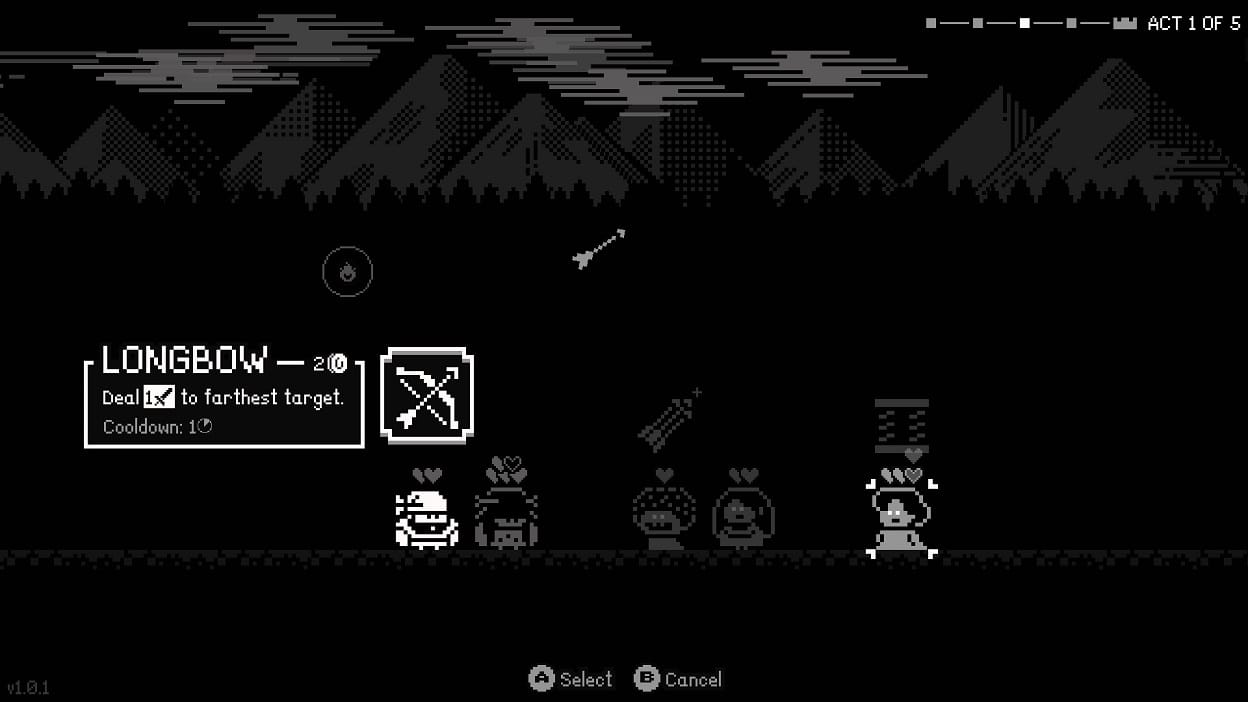
Bossfight Tactics
Bossfight Tactics is a party-based strategy game that pits players against their own previous characters. It's a game with some interesting but frustrating twists on the usual tactical game.
The player controls a three-character party with the objective of defeating or evading a series of enemy parties. Character actions are based on the equipment they carry, with each character having three to five slots. The player has a limited number of moves each turn, which can be distributed between the characters as desired. Enemies drop their gear upon being defeated, and a quick character can scoop it up, either to use or sell it to the merchant who trails the party at all times.
Each run is divided into a series of acts, which, in turn, are broken down into individual fights. Upon defeating the boss party at the end of an act, the player's party is anointed as the new bosses for the following act. The player then gets a new party and must again fight through a series of lesser groups with the goal of defeating their own previous party.
The game field in Bossfight Tactics is one-dimensional, much like in Shogun Showdown, but the addition of multiple player-controlled characters makes movement a far greater challenge here. There is no standard movement option - the only way to maneuver is by using items, some of which can be a bit gimmicky. This is easily the hardest aspect of the game, as getting characters into position to fight can demand a lot of logistical headaches while leaving party members exposed to danger.
Overall, Bossfight Tactics has some interesting ideas, but the quirks in the combat system can be frustrating, and it's only recommended for advanced players seeking a serious challenge.
Bossfight Tactics is available for PC via Steam. A copy was provided for this review.
That wraps up our look at the indie games that caught our attention in August! Be sure to come back each month for more of those sweet, sweet indie games you need to know about!
